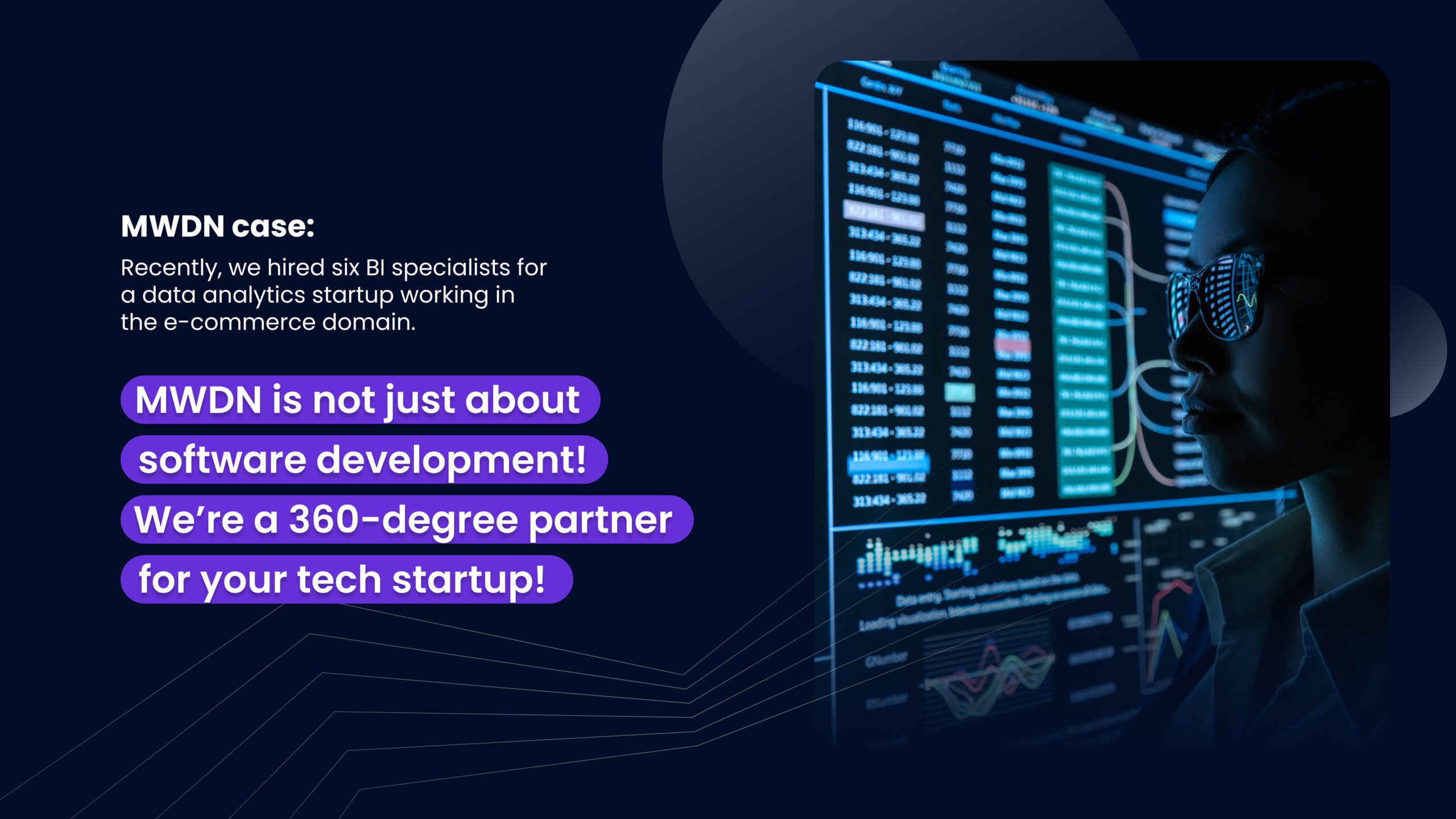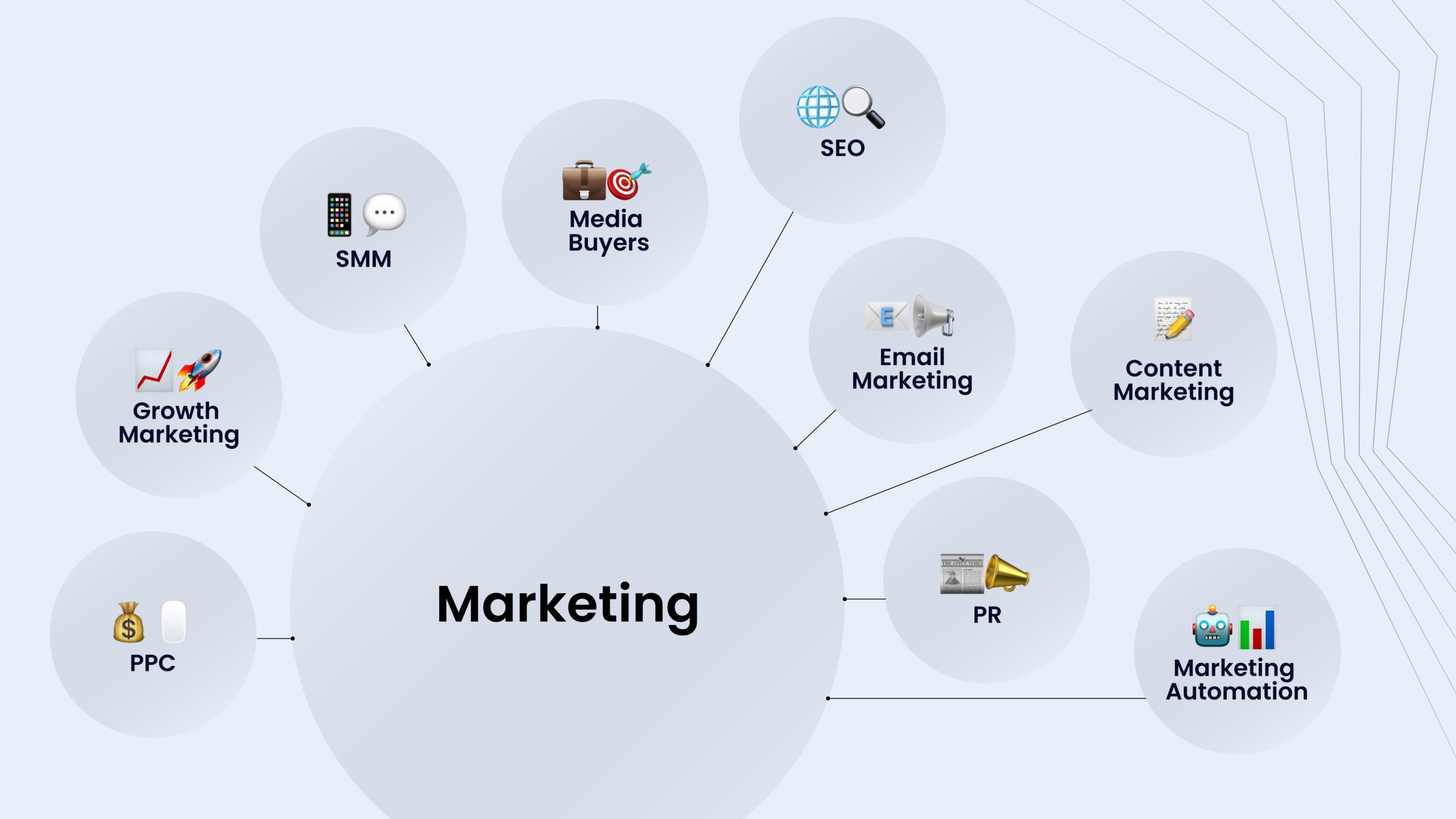
Almost 80% of our clients come to us for strictly technical IT specialists like software developers and QA engineers. As a rule, these specialists have tech tasks to do, and their efficient work rarely includes constant synchronized communication with their teammates.
Why don’t they hire the rest of their teams via staff augmentation? Some businesses might doubt whether their BIs, BAs, or designers, aka people who work in closer collaboration with other team members, can provide good results while working remotely from another country.
After decades in the staff augmentation sphere, we can say that there should be no fears! All you have to do is invest in hiring and choose a truly fitting specialist who will stay for you as long as you need them to. And yes, these can also be non-technical and other non-conventional IT hires!
Content:
- Why do clients choose to outstaff non-conventional specialists?
- BA/BI – your bridge between business and tech
- Lead generation managers – fueling the growth engine
- Marketing specialists of all kinds
- Sales representatives
- Customer support
- How does MWDN can help your business?
Your product may be the fuel, but it’s the marketing team that ignites the fire, guiding the ship toward the right target audience. The sales team acts as the guidance system, navigating the market and finding the right customers. Business analysts are your mission controllers, constantly monitoring performance and making adjustments to keep you on course.
- A groundbreaking product can flop if nobody knows it exists. (Marketing)
- The most innovative solution won’t sell itself. (Sales)
- Even the best product can veer off course without data-driven insights. (Business Analysis)
The key to a successful startup is a harmonious blend of technical brilliance and strategic execution. This is exactly what this article is about – the non-conventional specialists crucial to your tech startup and how you can find and hire them with staff augmentation services!
Why do clients choose to outstaff non-conventional specialists?
Clients often choose staff augmentation to hire non-conventional specialists like BI professionals, business analysts, and sales representatives. There are some strategic reasons for such a choice, especially for startups.
1. Greater control
With staff augmentation, clients have direct control over the augmented team members. This is particularly important for roles like business analysts and BI specialists, where strategic alignment and frequent communication are critical.
2. Seamless integration with internal teams
Staff augmentation allows specialists like business analysts or project managers to work closely with internal teams, ensuring a cohesive strategy and more effective knowledge transfer. This embedded collaboration leads to better results compared to the isolated nature of traditional outsourcing.
Moreover, augmented staff can be chosen based on their ability to integrate into the startup’s culture and work processes, which is essential for roles like sales representatives who need to embody the company’s ethos in client interactions.
3. Maintaining strategic confidentiality
For roles like BI and business analysts, startups may be dealing with sensitive data and proprietary strategies. Staff augmentation allows them to retain these specialists closer to the core team, reducing the risk of exposing critical information compared to outsourcing the entire function to an external vendor. By outstaffing, startups maintain more control over intellectual property, especially in roles that directly influence business strategy and decision-making.
4. Tailored strategic alignment
Business-related specialists need to deeply understand the startup’s vision and strategy. Staff augmentation allows for a closer alignment between the augmented team and the startup’s strategic goals compared to traditional outsourcing, which may operate at arm’s length.
In roles like business intelligence, where continuous data analysis and reporting are required, having augmented staff involved long-term ensures consistency and alignment with evolving business strategies.
5. Reduced risk of misalignment
Business analysts and BI experts often play crucial roles in decision-making. By outstaffing these roles, startups minimize the risk of misalignment between the strategy and execution, as these professionals work closely with internal leadership, unlike in a traditional outsourcing model where there might be more disconnect.
6. Better communication and collaboration
Staff augmentation provides real-time communication and collaboration, which is crucial for business-related roles that need to interpret complex data and provide insights quickly. Even if working remotely, augmented specialists are treated as part of the core team, ensuring smoother and more efficient collaboration than traditional outsourcing setups.
BA/BI – your bridge between business and tech
Imagine you’ve got a revolutionary product idea, a team of developers building it, and marketing pros ready for launch. But before you take off, there are some crucial pieces missing: a business analyst and a business intelligence specialist. These are four reasons why you would need them.
- Data analysis and reporting. Both Business Analysts and Business Intelligence professionals are heavily involved in data analysis. BAs might focus on specific project data or user behavior, while BIs typically analyze larger datasets and historical trends. They translate raw data into clear reports and visualizations that can be understood by business stakeholders.
- Identifying business needs and opportunities. BAs benefit from an understanding of business processes and user needs to identify areas for improvement. They work closely with different departments of your business to gather requirements and uncover potential problems. BI professionals analyze data to identify trends and patterns, which can reveal opportunities for growth, cost savings, or process optimization.
- Developing solutions and recommendations. BAs take their analysis and translate it into actionable recommendations. This could involve suggesting changes to workflows, user interfaces, or product features. BI specialists use data insights to recommend strategies for improving business performance or achieving specific goals.
- Communication and collaboration. Both BAs and BIs need excellent communication skills to present their findings and recommendations to non-technical audiences. They collaborate with stakeholders across different departments to ensure everyone understands the data and its implications.

This is what MWDNers working as BI analysts for our client Triple Whale say about their work: “My team and I create reports for the company’s clients. Our work is closely connected with other teams of the company. We are constantly communicating with other departments about improving the product, proposing and introducing new functionality. Also, we interact a lot with the CSM team, as they are the “bridge” between us and the clients.”
Lead generation managers – fueling your growth
A lead generation manager is a strategic hunter who brings potential customers to your doorstep. Their role goes beyond simply filling the funnel. A skilled lead generation manager acts as the bridge between your innovative product and the market. What exactly do they do?
- They understand your target audience and translate your product’s technical description into a captivating story that resonates with potential customers and sparks their interest.
2. They use analytics to create the ideal customer profile. This laser focus ensures your message reaches the right people at the right time, maximizing your return on investment.
3. They explore marketing channels – from social media campaigns to content marketing strategies. They experiment, analyze results, and constantly refine their approach to ensure a steady stream of qualified leads.
4. They understand that conversions aren’t instantaneous. Lead generation managers nurture relationships with potential customers, providing valuable content and addressing their concerns. They build trust and position your startup as the trusted authority in its space.
Skills:
- Marketing expertise,
- data analysis,
- understanding of customer acquisition strategies,
- project management.
Impact: Generates qualified leads for sales teams, identifies new market opportunities, and increases brand awareness.
Marketing specialists of all kinds

Here’s a breakdown of some key marketing specialists and how they contribute to a startup’s growth:
Content marketing specialist
Creates valuable, informative content (blogs, articles, social media posts, white papers) to attract and engage potential customers, establish brand authority, and educate them about the product’s value.
Why does your startup need them? Content marketing is a cost-effective way to build trust and brand awareness, generate leads, and position your startup as a thought leader in tech.
SEO specialist
Optimizes the website and online content to rank higher in search engine results pages, ensuring your target audience can easily find your startup online.
Why do you need them? Organic search visibility is quite important. An SEO specialist helps potential customers discover your product when they’re searching for solutions online.
SMM specialist
Manages your startup’s social media presence, creating engaging content, running targeted ads, and interacting with potential and existing customers to build brand loyalty and community.
Why hire an SMM specialist? Social media platforms are powerful tools for brand awareness, lead generation, and customer engagement. A social media specialist helps you benefit from these platforms and reach your target audience.
PPC advertising specialist
Manages paid advertising campaigns on search engines and social media platforms. They target potential customers based on demographics, interests, and online behavior, driving qualified traffic to your website.
Why do startups need them? PPC advertising allows for targeted and measurable marketing efforts. It can quickly generate leads, driving traffic to your product or service.
Email marketing specialist
Manages email marketing campaigns, crafting engaging emails that nurture leads, promote products and services, and build customer relationships.
How can your startup benefit from them? Email marketing offers a high return on investment and stimulates personalized communication with your target audience. It’s a powerful tool for customer retention and ongoing engagement.
PR specialist
Secures positive media coverage for your startup, building brand awareness, increasing credibility, and attracting potential customers and investors.
Why do you need them? PR can transform your startup into the spotlight, generating buzz and establish your brand as a leader in the tech industry.
Growth marketing specialist
Analyzes data and user behavior to identify growth opportunities, experiments with different marketing strategies, and optimizes campaigns for maximum impact.
Why do startups need them? A growth marketing specialist helps your startup experiment, learn, and adapt your marketing efforts for continuous improvement.
Marketing automation specialist
Implements marketing automation tools to streamline repetitive tasks, personalize customer experiences, and improve marketing campaigns.
Why hire this specialist? Marketing automation saves time and resources. It also personalizes your marketing efforts, leading to higher engagement rates.
Media buyer
Purchases advertising space across various digital platforms (search engines, social media, display networks) based on campaign goals and budget. They negotiate rates with ad networks, manage ad placements, and optimize campaigns for maximum reach, engagement, and conversions.
Why do startups need them? Media buyers possess a unique blend of technical knowledge and negotiation skills. They ensure your startup gets the most out of its advertising budget by securing the best ad placements at the most competitive rates. In the complex world of online advertising, a skilled media buyer can be the difference between a successful marketing campaign and wasted resources.
While a startup might not need a dedicated media buyer right away, their expertise becomes invaluable as the company grows and marketing budgets increase.

Sales team
What kind of salesmen exactly do you need to boost the profit of your startup? Here are three roles your business should have.
Sales development representative
SDRs are the front line, prospecting for potential customers, qualifying leads, and scheduling appointments for the Account Executives. They’re data-driven, using outreach strategies like email sequences and cold calling to generate a steady stream of leads for the sales funnel.
Why do startups need them? SDRs free up AEs’ time for closing deals. They ensure the sales funnel stays full with qualified leads, maximizing the team’s efficiency and accelerating sales growth.
Account executive
AEs build relationships with leads, understand their needs, and present your product’s value proposition in a compelling way. They navigate complex sales conversations, overcome objections, and ultimately close deals.
Why do startups need them? AEs are the cornerstone of your sales engine. Their expertise in converting leads into paying customers directly translates into revenue growth for your startup.
Customer success manager
They don’t just close deals; they build relationships. CSMs ensure customer satisfaction and long-term success. They onboard new customers, provide ongoing support, and identify upsell and cross-sell opportunities, maximizing the lifetime value of each customer.
Why do startups need them? Customer retention is crucial for sustainable growth. CSMs not only ensure happy customers but also uncover opportunities to expand existing accounts, generating recurring revenue streams.
Sales manager
They’re the architects of the sales strategy. Sales managers set quotas, coach and mentor the sales team and analyze sales data to identify areas for improvement. They work closely with marketing to ensure alignment and develop winning sales strategies to achieve your startup’s overarching goals.
Why do startups need them? Sales managers guide the team toward success. They provide direction, analyze performance, and constantly optimize the sales process to maximize return on investment.

Customer support
An outsourced customer support team acts as an extension of your startup, ensuring your customers receive exceptional service across various channels, 24/7. They use technology, data, and collaboration to stimulate processes, improve efficiency, and ultimately contribute to a positive customer experience that fuels your brand loyalty and growth.
So, what exactly does an outsourced customer support team do? They’re the human voice of your brand, resolving issues, answering questions, and ensuring a smooth customer experience.
In 2024, the best way to maintain high-quality customer support is to outsource this function entirely to specialized vendors. By finding your support partner, you can achieve:
- Multi-channel support
- 24/7 availability
- Technical expertise
- Data-driven approach
- Higher customer satisfaction
How does MWDN can help your business?
Of course, these are not all non-technical roles your tech startup might need. Some businesses outsource recruitment, HR management, accounting, payroll processes, etc. But wait! You can get all of them as a part of the staff augmentation agreement with MWDN!
When you hire remote dedicated specialists for your project via MWDN, we offer 360-degree care for your new hires! As part of our contract, we cover recruitment, onboarding, HR management, conflict resolution, administrative issues, payroll, taxes, and more.
Want to know more about how staff augmentation works and how it can help your startup grow? Book a call with our representative today!

